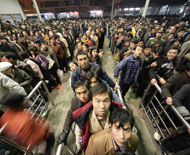
The nation's rail system is under the spotlight again as the peak Spring Festival, or Chinese Lunar New Year, travel season officially started on Tuesday.
The network can only adequately handle an average of 2.74 million passengers per day, 890,000 fewer people than the estimated number traveling daily over the holidays, Hu Yadong, vice minister of railways, said at a news conference in Beijing yesterday.
The gap between capacity and demand might increase to as many as 1.76 million at peak periods, Hu added.
According to estimates by the Ministry of Railways, in the next 40 days around 145 million people are expected to travel by rail for family reunions over the festival, which begins on February 9.
The deluge is expected to peak on February 4-6, 15-17 and 25-28, as migrant workers and college students flock to stations for trips back and from home.
A large number of people choose train travel because they regard it to be economical and safe.
The annual exodus began early in many cities, where officials organized special, low-priced trains to take migrant workers and students out of town in advance of the expected throngs.
Meanwhile, the ministry ordered 15 to 20 percent increases in train ticket prices for the third year running in an attempt to dampen demand.
However, it is expected to remain high and many cities have scrambled for extra trains to keep pace.
Some 260 pairs of temporary trains are being used, bringing the total number to 646 pairs across the country, the ministry said.
Buying a ticket has become a difficult task, with long lines snaking from ticket booths.
Wang Min, director-general of the ministry's Planning Department, attributes the headaches to existing railway bottlenecks.
"Inadequate railway capacity fails to meet the demands of intensive passenger flows, which leads to passenger competition for tickets," Wang said.
The problem faced in peak travel periods each year lies in the fact that the development of railways lags far behind the nation's economic growth, he added.
The ministry is working to attract additional investment into the sector to expand the railways, including foreign and private capital, Wang said.
Currently, railway construction is financed by central and local governments.
"Market access will be widened to enterprises to encourage them to invest their capital into railway projects," Wang said.
Besides rail transport, the number of road and air passenger trips are also expected to rise 3.5 percent to 1.79 billion and 12.5 percent to 12.6 million respectively compared with the same period last year.
(China Daily January 26, 2005)
|

